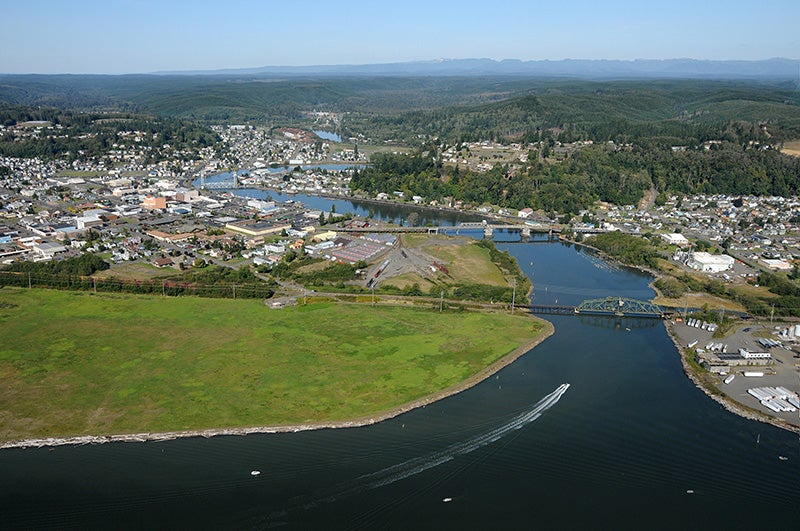Company Abandons Crude Oil As Part of Shipping Expansion Plan in Grays Harbor
Victory
—Groups applaud decision, caution oil spill threats from two remaining proposals persist
Contact
One of the three companies proposing crude oil shipping terminals in Grays Harbor said it will abandon its plans to handle crude oil in comments submitted to state and local agencies in late November 2015. The company’s comments state “REG has concluded that its future plans at Grays Harbor do not include handling crude oil.” The Quinault Indian Nation, Stand Up To Oil campaign and community groups are applauding REG’s decision, but say they will continue to closely monitor the company’s planned expansion of its existing terminal. Renewable Energy Group (REG), an Iowa-based company, purchased Imperium Terminal Services during the environmental review process.
Grays Harbor is located in the city of Hoquiam, along the Washington coast.
“REG’s decision is a strong affirmation the company took to heart the concerns of thousands of people who spoke out about the dangers of crude oil storage and transport to our communities and waterways,” said Fawn Sharp, President of the Quinault Indian Nation. “The Quinault Nation looks forward to working with REG and other businesses that share a vision for a sustainable future and together build an ever stronger Grays Harbor.”
“We are pleased that REG has listened to the people and made this decision. Now we need to continue our fight to convince the other proponents that it is time to follow this lead and abandon their risky projects to bring crude oil to Grays Harbor,” said R.D. Grunbaum with the Stand Up To Oil campaign and Citizens for Clean Harbor. “We can have a healthy environment that allows our families to prosper and a strong economy without the risk of oil spills and accidents.”
REG’s Grays Harbor facility is one of the largest producers of biodiesel in the nation, a low-carbon, sustainable alternative to petroleum-based fuel. “We are excited to see REG’s commitment to growing the markets for sustainable fuels that will reduce pollution in the transportation sector,” said Ross Macfarlane, Senior Advisor for Climate Solutions, a Northwest Clean Economy non-profit.
The groups caution that there is still a long road ahead to protect communities and economically valuable waterways from the threat of oil train accidents and spills from oil trains, storage tanks, barges and tankers. Two other crude oil proposals remain and REG has not yet provided details of the change in the company’s expansion plans.
State and local officials received more than 100,000 public comments on the Draft Environmental Impact Statement for the proposed Imperium and Westway terminals from Tribal, commercial and recreational fishermen, local elected officials, health professionals, scientists, conservation organizations, concerned citizens, faith organizations and local, state, and federal agencies.
Designed to handle 78,000 barrels of crude per day, REG’s proposed terminal would have been the largest of three crude oil-by-rail facilities in Grays Harbor in the city of Hoquiam on the Washington Coast. For now, the permitting process for two additional proposals continues.
In addition to the now two proposals in Grays Harbor, there are also two more proposals for oil terminals in Vancouver, Washington, as well as a proposal to increase the oil by rail capacity of the Shell Oil Refinery in Anacortes. The U.S. Congress’s recent vote to lift the crude oil export ban adds another layer of urgency to the defeat of these proposals.
Earthjustice represents the Quinault Indian Nation in its ongoing challenges to crude-by-rail proposals in Grays Harbor.
Read the company’s letter submitted to state and local agencies.
Facts about the value and risks of crude oil to the maritime economy of Grays Harbor:
- An economic study commissioned by the Quinault Indian Nation found that a major oil spill could put more than 150 tribal commercial fishermen out of a job, resulting in a direct loss of as much as $20 million in wages and up to $70 million in revenue for affected businesses.
- Marine resource jobs support more than 30% of Grays Harbor’s workforce according to a 2013 study by the University of Washington.
- In 2014 Washington residents took an estimated 4.1 million trips to the Washington Coast spending $481 million according to a recent study. More than one-third of those visits were to Grays Harbor County to enjoy its spectacular and productive coastal and ocean waters.
- The Washington State Department of Fish and Wildlife stated “Grays Harbor is an area particularly sensitive to the adverse effects of oil spills.”
Mapping Crude-By-Rail Across America
Railroad shipments of volatile crude oil into America’s cities have dramatically increased, with explosive results. See a map and timeline of some of the recent crude-by-rail accidents and the communities who are fighting back:

Additional Resources
About Earthjustice
Earthjustice is the premier nonprofit environmental law organization. We wield the power of law and the strength of partnership to protect people's health, to preserve magnificent places and wildlife, to advance clean energy, and to combat climate change. We are here because the earth needs a good lawyer.